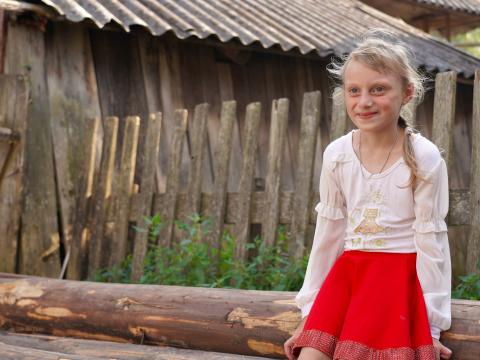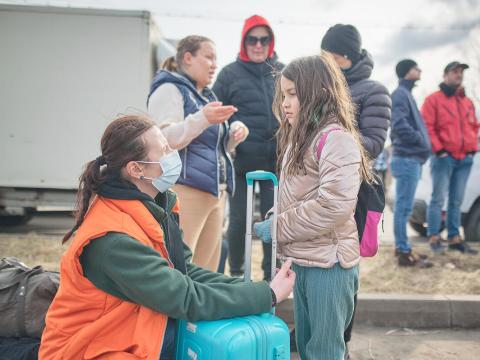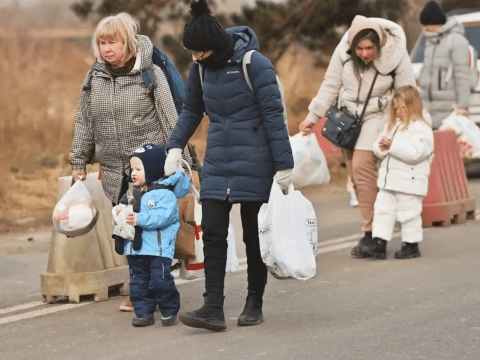
Let's end double standards towards refugees
Eleanor Monbiot writes why the current global response to forced displacement is both immoral and incredibly short-sighted
27 June, 2022
We should all celebrate the opening of borders and homes to receive the millions of Ukrainians in the last months. But this generosity simply highlights again the huge disparity and hypocrisy in the way we treat the rest of the world’s refugees.
People have moved across borders for millennia. Refugees and migrants have positively shaped and built societies and cultures, and continue to do so. Even before the recent events in Ukraine, the global numbers of displaced people are unprecedented, driven by increased conflict, climate change and economic desperation.
Away from the Ukraine crisis, hostility by host governments and punitive migration laws are growing. The situation in Afghanistan is a harsh example, with most Afghans who applied under the UK Government’s visa schemes 10 months ago yet to receive even the most basic acknowledgement, let alone authorization to travel. Meanwhile the UK Government is now sending out a clear signal that those who come to the country illegally will have no right to stay, and that they will use every tool and piece of legislation to ensure they can deport people to Rwanda – this includes refugees fleeing conflict in Sudan, Afghanistan and Syria.
This issue is personal for me. Forced displacement is a thread that runs through my family’s history, and I feel its effects to this day. One branch of my family fled religious persecution, moving across Europe in the early 1800s, pushed out of every town and job. Finally arriving in England as destitute economic migrants in 1843, settling in the slums of London rife with smallpox and cholera. On the other side of my family, in 1914 my grandfather, aged 8, his mother and sister fled the German invasion on one of the last boats out of Belgium. Taking with them just what they could carry. Arriving in London as refugees, they were lucky to be welcomed into a host family, who themselves had been the refugees of the century before. The host family had a 6-year-old daughter, who many years later became my grandmother. Unlike many hosting situations which sadly implode within weeks or months, due to the financial and physical pressure of people in your home, they were able to find a way forward.
Both families, 70 years apart, were privileged to be allowed to earn a living in their country of refuge, enabling them not just to survive, but to thrive, eventually become citizens and make significant contributions to that country. Though even with this positive experience, fear of persecution and lack of acceptance remained a current through several generations.
Over 100 million people are today forcibly displaced. Children make up 28 per cent of the global population, but are 41 per cent of those who have been forced to flee their homes.
Guilty of no crime, yet treated as unwanted inconveniences, children’s lives can change in an instant, losing their homes, their friends and, frequently, their opportunity for education and a meaningful future. Their rights violated through forced marriage, child labour, sexual and physical abuse, often as a result of their parents being driven into extreme poverty having been denied work as refugees.
International refugee law was 70 years old last year – agreed by governments at the 1951 Refugee Convention – and enshrines the rights of refugees and countries’ legal duties to protect them. It sets multiple explicit obligations for host countries, including permitting people seeking asylum to engage in both wage-earning and self-employment.
Yet repeatedly, this law and the promises it commits to are broken by signatory governments.
By denying the right to work, host governments are denying themselves of the skills and capacities of the displaced, whose average period of displacement is 19 years – that’s 19 years of not wanting to be fully dependent on aid, but desperate to make a meaningful contribution to their host country, to feel valued and be valuable.
Yet there are a few, like Uganda, which have taken a different path. Home to over 1.5 million refugees, Uganda has proactively supported them to engage in livelihoods, providing land for farming, allowing refugees to legally work and access the Ugandan education system. I have seen the impact of this - South Sudanese refugees moving from being dependent on humanitarian handouts to being self-sustaining, making positive economic contributions and feeling the sense of celebration that comes with it.
But for every Uganda there are many others that refuse to set up places of refuge, force camps to close, forbid any kind of income-earning and place such barriers on aid that even the most basic rights of food, water, shelter and education are denied, condemning a whole generation of children to despair, poverty, abuse and high mortality.
While it is easy to point the finger at host countries, it is critical to understand that 85 per cent of refugees are hosted by developing countries. The burden of helping those most in need, once again, is falling on those who themselves are struggling.
The world’s richest countries must shoulder more of the responsibility as they are now doing with Ukraine. This positive response, though, contrasts starkly to their normal position on hosting and resettling refugees which is woefully inadequate. At the same time as Poland welcomed 3.5m Ukrainians, a couple of hundred kilometers north, Poland is completing a €350m wall intended to keep asylum seekers from other countries out. Not content with closing borders, Western governments worsen the burden carried by low-income countries by failing to fund programs.
One in four people in Lebanon is a refugee, which is asking the impossible of the country’s already weak systems and infrastructure. Yet only 29 per cent of their required refugee budget is met, resulting in the UN and NGOs having to make desperate decisions on who gets what. As a result, 90 per cent of Syrian refugees in Lebanon live in extreme poverty and 50 per cent are food insecure. Despite Uganda’s highly progressive refugee policy, the donor pledges up to March 1, 2022, are 7 per cent of what is needed. Another broken promise and a lost opportunity to back a winning formula.
The current global response to forced displacement is both immoral and incredibly short sighted. We must learn from the past, stop the broken promises of the present, replacing them with opportunity and hope for the future.
Imagine what all the refugees of today could achieve and contribute, if given the same opportunities as my grandparents and great grandparents, and what Ukrainians are being provided with today.
Eleanor Monbiot, OBE, is World Vision’s Regional Leader for the Middle East and Eastern Europe
A shorter version of this article first appeared on The New Arab website

